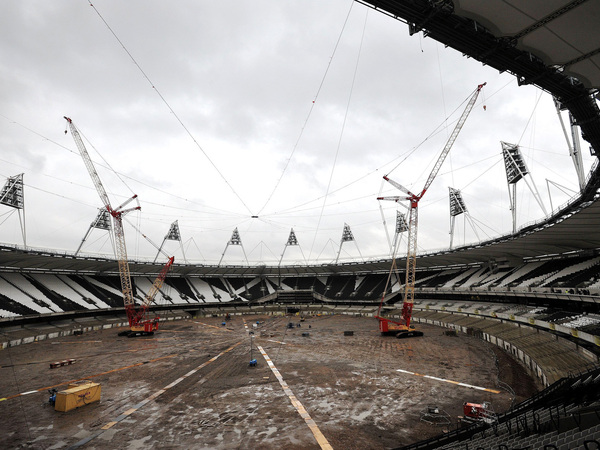The Olympics are a great party, but not a great investment

NPR correspondents Ari Shapiro, in London, and Joanna Kakissis, in Athens, teamed up for this joint look at Olympics economics.
The Winter Olympics in Sochi are just a few days away. Russia has spent $50 billion on everything from construction to security, making these the most expensive games in history.

Countries often justify the Olympic-sized price tag by saying the investment pays off in increased business and tourism.
It may look that way at first. In London these days, the Olympic complex looks like an anthill of activity, with a huge shopping mall, construction cranes updating the stadium used in the 2012 Summer Games, and buildings that housed athletes and are now high-end apartments, condos and even student housing.
Create a More Connected Minnesota
MPR News is your trusted resource for the news you need. With your support, MPR News brings accessible, courageous journalism and authentic conversation to everyone - free of paywalls and barriers. Your gift makes a difference.
It looks a lot different in Athens. The main Olympic complex, located in the northern suburb of Marousi, is mostly bare. The buildings are rusty and empty, and the landscape is bleak, with a lone souvlaki salesman peddling his wares outside the front entrance before a local basketball game on a recent day.
In some ways, Athens is a cautionary tale of what could happen if governments don't plan well for what will come after the Olympics. Everything seems great right after the games, as in London, but then after five or 10 years, it's often a different picture.
Athens staged the Summer Games in 2004, with a final price tag of more than $15 billion. That contributed to the country's enormous debt load, which sparked the current economic crisis and bailout.
The games did spur development that may not have been built otherwise, including an impressive metro, highways and an international airport. But a decade after the games, many of the 24 Olympic venues remain unused.
And the main Olympic complex, which is covered with graffiti about local sports teams and dumbed-down anarchist slogans, is underused, says Haris Zouroufidis, who lives nearby.

He and his 11-year-old son, Alexandros, bicycle around the Olympic complex a couple of afternoons a week.
"Everything has broken apart and no one bothers to fix it," Zouroufidis says. "The water in the reflecting pool is dirty. All these expensive structures are just rotting before our eyes as time passes."
In London, the games are still so recent that there's a lot of positive feeling — and a lot of unanswered questions.
Gareth A. Davies, a sportswriter and broadcaster in the U.K., says the Olympics were "certainly the best experience of my career." Like Athens, the London Olympics cost $15 billion, and Davis thinks the price was worth it.
"I think one of the knee-jerk reactions has been ... 'will we be left with a load of white elephants?' " he adds.
The answer from most economists who study the Olympics is: Yes, you will.

"Most countries end up with a lot of debt, a lot of white elephants, and quite a bit of infrastructure investment that is not ideal for the type of development needs that the city has," says Andy Zimbalist, a professor of economics at Smith College in Northampton, Mass.
Zimbalist says this is a direct result of the way Olympic bidding works.
The International Olympic Committee pits one city against another. In each city, construction and architecture firms that stand to profit from the games push local leaders to make higher bids and more ambitious plans.
"You have cities putting out their enormously complicated and elaborate plan to do everything and more than the IOC ever asked for," he says. "And so the cards are stacked against any host city."
These aren't ideal conditions for urban planning, sometimes on a mass scale.
"And somehow, it happens almost every single [Olympics] cycle," Zimbalist says.

The one exception every economist points to is Los Angeles, host of the 1984 Summer Olympics. That's because no other city bid to host the games that year, so L.A. hardly needed to do any special construction.
Even if facilities sit empty after the games, many host countries point to another possible economic benefit. They claim that a publicity boost from the Olympics will help a city with tourism and international business.
Allen Sanderson, senior lecturer at the University of Chicago who specializes in sports economics, investigated that question.
Related NPR Stories
He and a student, Samantha Edds, compared cities that hosted the Olympics with similar cities in the same country or region that did not. The cities were also comparable in other ways — size, population and tourist appeal.
They compared Atlanta, which hosted the Olympics, to Charlotte, which did not. They pitted Olympic city Barcelona against Madrid, and matched up Sydney, Australia, against Melbourne.
They checked for marked growth in construction, tourism and the financial-services sector over a nine-year period — four years before the games, and five years after.
"We couldn't find any difference in terms of building permits, tourism, anything before or after," Sanderson says. "If you masked the name of the cities, you would not be able to tell which of these two cities had the Olympics and which did not."
According to Sanderson, this doesn't mean cities should stop competing to host the Olympics; it just means they should stop claiming that the games make economic sense.
"We do lots of things that don't turn a profit," he says. "We own dogs. We have boats. Those things lose lots of money, but we know it."
So cities, go ahead and host the Olympics. It's a great party.
It's just a terrible investment. Copyright 2019 NPR. To see more, visit https://www.npr.org.